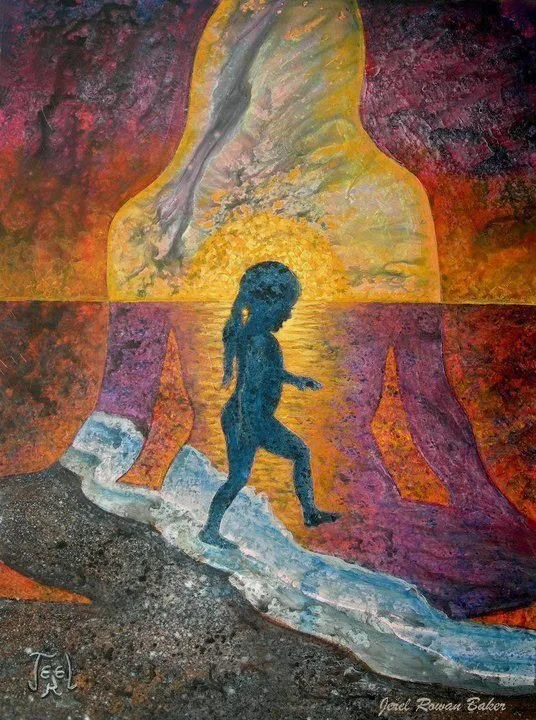Childhood Trauma & The Origin of Self Doubt: How to Heal and Thrive
Image Source: (J.R Barker) Pinterest
The Roots of Self-Doubt: How Childhood Trauma Creates the Belief “There is Something Wrong with Me”
Our childhood plays a vital role in shaping our beliefs and personalities. It is the foundation that shapes our worldview and beliefs about ourselves and others. Unfortunately, not all childhood experiences are positive, and the negative experiences can leave deep-rooted scars that influence our behaviors and thoughts. One of the common beliefs that emerge from childhood trauma is the belief that "There is something wrong with me." It is a corrosive belief, riddled with self doubt, that can hold us back from pursuing our dreams and living life to the fullest. But where does it come from and why is it so hard to shake off? In this post, we will explore the root of this belief and shed some light on how we can heal from it.
Internalising Abuse
The belief that "there is something wrong with me" often has its roots in childhood trauma. Traumatic experiences like neglect, abuse, or abandonment can create a profound sense of shame and unworthiness, which can linger long after the actual events. Children are wired to think that their caregivers’ behavior and actions are a reflection of their worth, so when parents or other significant figures mistreat or reject them, they internalise the message that they are defective or unlovable.
Self Doubt and Insecurity
Moreover, when love and validation are inconsistently given, children develop a sense of insecurity and mistrust of their own feelings and perceptions. They learn to second-guess themselves and rely on external feedback to regulate their sense of self. This dynamic can give rise to a lifelong pattern of seeking validation, people-pleasing, and perfectionism, which only reinforces the sense that one is never enough.
It Was Never About You
However, healing is possible and involves acknowledging that the source of the belief is not you. It is a product of circumstances and conditioning that you had no control over. It is crucial to recognize and grieve the losses and wounds of the past, but also to challenge the assumptions and beliefs that stem from them. Instead of trying to prove or disprove the belief, it is helpful to reframe it as a hypothesis that can be experimentally tested. Are you willing to consider the possibility that there is nothing inherently wrong with you and that you deserve compassion and acceptance?
Self-Compassion
One powerful way to challenge the belief is to practice self-compassion. Self-compassion involves treating oneself with the same kindness, concern, and support that one would offer to a good friend or child in distress. It means acknowledging one’s pain and suffering without judgment or criticism and recognising that all humans share in the experience of imperfection and fallibility. Research has shown that self-compassion is linked with greater emotional resilience, well-being, and greater adaptability to change. Allow yourself to feel how you genuinely feel. Validate that you are going to be there for yourself and accept your feelings through it all. This is a practice and something that is learnt and developed, so be gentle with yourself.
The Power Of Community
Another crucial aspect of healing is building a supportive community of people who understand and validate your experience. Many people who have experienced childhood trauma struggle with feelings of alienation and isolation, as they fear that others will judge or reject them if they reveal their true selves. However, connecting with others who have experienced similar challenges can be incredibly healing and uplifting. Support groups, therapy, or coaching can provide a safe space for exploring and transforming the belief that “there is something wrong with me.” Working with others in processing childhood trauma is an extremely potent healing experience and one I highly recommend. The power of being held by others or in community is not to be taken lightly.
Finally…
The belief that “there is something wrong with me” is a common but destructive pattern that can undermine our sense of self-worth and limit our potential. However, by recognising its roots in childhood trauma, we can begin to loosen its grip on us. Healing involves acknowledging that the belief is not an accurate reflection of reality, but a product of conditioning that can be challenged and transformed. By practicing self-compassion, building a supportive community, and reframing our beliefs, we can cultivate a deep sense of inner worth and resilience that can carry us through life’s challenges. Remember, it was never about you, but it is up to you to change your story.
The process of deepening your connection within is extremely powerful in healing wounds, particularly those created in childhood.
If you’re ready to dive deep or would like support on your journey, book a session below!
Make sure to subscribe below to receive updates on my upcoming course, where I share powerful processes tailored to inner healing and transformation.
